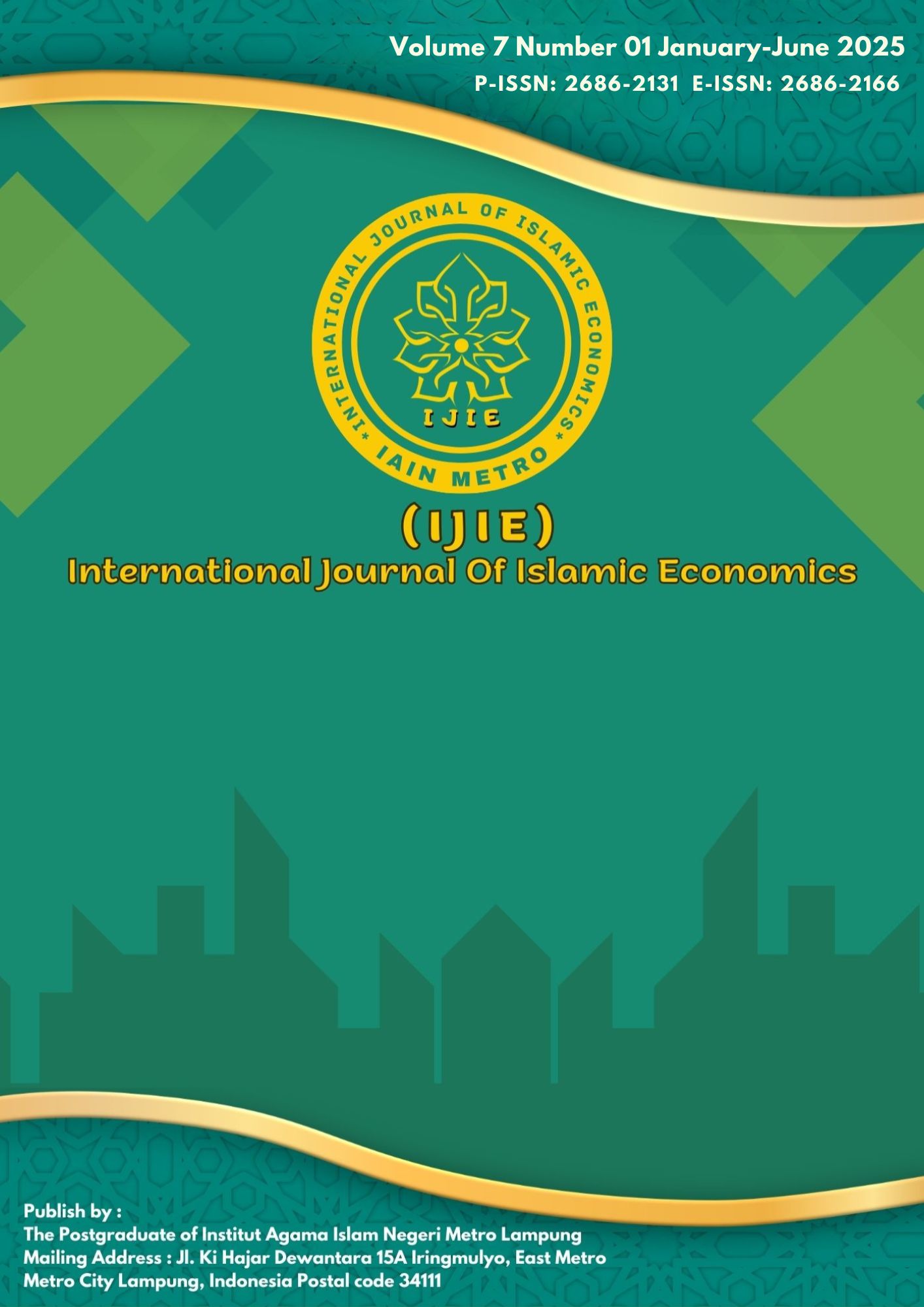Analysis of the Influence of International Trade, Foreign Investment, and Exchange Rates on Economic Growth in 5 Asean Countries from the Perspective of Islamic Economics 2015-2023
DOI:
https://doi.org/10.32332/ijie.v7i01.10499Keywords:
Economic Growth; Exchange Rate; Foreign Investment; International Trade; Islamic EconomicsAbstract
Introduction: This study's background is based on the importance of economic stability and growth in the face of changing global dynamics, where regional economic integration is a key factor in determining the region's competitiveness. Objective: This study analyzes the effect of international trade, foreign investment, and the exchange rate on economic growth in the ASEAN region from 2015 to 2023. Method: This study uses a quantitative approach, using panel secondary data obtained from the World Bank and analyzing it through multiple linear regression models using EViews 13 software. Results: The results show that international trade has a significant and positive influence on economic growth in ASEAN countries, signaling its central role in driving regional economic activity. In contrast, foreign investment does not show a significant effect on economic growth over the observed period, indicating that the role of foreign investment is not optimal or may be hampered by structural factors and domestic policies. Meanwhile, the exchange rate shows a positive relationship with economic growth, which may imply that exchange rate stability supports trade and investment activities. Implications: The implications of these findings emphasize the importance of strengthening foreign trade policy and managing a stable exchange rate as key strategies in promoting sustainable economic growth. In the context of Islamic economics, this study also reflects the importance of balance between economic interests and social values, where growth is not only measured in material terms, but should also reflect social justice, welfare, and sustainability.
Downloads
References
Afriyanti, N., & Prasetiyo, L. (2021). Pengaruh Inflasi dan Pertumbuhan Ekonomi Terhadap Nilai Tukar Rupiah dalam Jangka Pendek dan Jangka Panjang Tahun 2010-2018. Journal of Islamic Economics (JoIE), 1(1), 24–40. https://doi.org/10.21154/joie.v1i1.3081
Agustin, S. (2024). Dampak Investasi Asing Langsung terhadap Pertumbuhan Lapangan Kerja Lokal. Ekonomi & Bisnis, 2(1), 1–13.
Aida, N., Ciptawaty, U., Gunarto, T., & Aini, S. (2021). Analisis Dampak Penanaman Modal Asing Dan Tenaga Kerja Asing Tiongkok terhadap Perekonomian Indonesia. Jurnal Ekonomi Pembangunan, 10(3), 159–167. https://doi.org/10.23960/jep.v10i3.301
Ananda, G. C., & Helman, H. (2023). Pengaruh Perdagangan Internasional terhadap Pertumbuhan Ekonomi. All Fields of Science Journal Liaison Academia and Sosiety, 3(4), 66–74. https://doi.org/10.58939/afosj-las.v3i4.690
Ananda Sholih Nasution, & Dewi Aryanti. (2023). Fostering Sincere Attitudes In Infaq And Charity According To Islamic Education. Lectures: Journal of Islamic and Education Studies, 2(3), 127–139. https://doi.org/10.58355/lectures.v2i3.35
Aviano, B. (2022). Kepentingan Tiongkok Dalam Penerapan Kebijakan Belt And Road Initiative (Bri) Di Zimbabwe 2013-2018.
Dolderer, J., Felber, C., & Teitscheid, P. (2021). From neoclassical economics to common good economics. Sustainability (Switzerland), 13(4), 1–20. https://doi.org/10.3390/su13042093
Sugiono. (2019). Metode Penelitian Kuantitatif, Kualitatif, Dan R & D. Sustainability (Switzerland), 11(1), 1–14. http://scioteca.caf.com/bitstream/handle/123456789/1091/RED2017-Eng-
Handayani, T., Wuriah Ningsih, D., Nurwisda, D., Budi Raharjo, D., Kunci, K., Transformasional, K., Karyawan, K., Diri, E., & organisasi dan kinerja Karyawan, K. (2022). Organizational Commitment Sebagai Variabel Intervening Terhadap Employee Performance Pada Pt Saprotan Benih Utama Pemalang. In Unikal National Conference.
Hotman, H., Sugeng, A., Triwibowo, A., & Alimuddin, A. (2023). Control Strategy in the Fight Again Internal Fraud (PT BPRS Kotabumi KC Bandar Lampung). Islamic Economics Journal, 9(1), 67–82. https://doi.org/10.21111/IEJ.V9I1.9569
Lubis, N. H., & Syarvina, W. (2024). Analisis Pengaruh Nilai Tukar (Kurs) dan Inflasi terhadap Pertumbuhan Ekonomi di Indonesia. Al-Istimrar: Jurnal Ekonomi Syariah, 2(2), 150–162. https://doi.org/10.59342/istimrar.v2i2.393
Maharani, S., & Ayu, R. (2024). Analisis Yuridis Ketentuan Negara Tuan Rumah Dalam Kegiatan Foreign Direct Investment (FDI) Berbentuk Joint Venture. Jurnal Ilmu Hukum, Humaniora Dan Politik (JIHHP), 4(4).
Normasyhuri, K., Ahmad, H., & Erike, A. (2021). Studi Komparasi Pertumbuhan Ekonomi Indonesia Sebelum dan Ketika Terjadinya Pandemi Covid-19. Ekonomikawan : Jurnal Ilmu Ekonomi Dan Studi Pembangunan, 21(2), 229–233. http://jurnal.umsu.ac.id/index.php/ekawan/article/view/8147
Normasyhuri, K., Budimansyah, B., & Triyadi, E. (2022). Dampak Penerbitan Surat Utang Negara (SUN) dan Surat Berharga Syariah Negara (SBSN) Pada Pertumbuhan Ekonomi Indonesia Era Pandemi Covid-19: Tinjauan Ekonomi Islam. Jurnal Ilmiah Ekonomi Islam, 8(1), 688. https://doi.org/10.29040/jiei.v8i1.4619
Prihadyatama, A. (2024). Panduan Praktis EViews: Konsep dan Contoh Penerapan dalam Penelitian Ekonomi. Widina Media Utama : Bandung.
Rezki Akbar Norrahman. (2024). Analysis of the Impact of Fiscal Policy on Economic Growth in Indonesia. Journal of Scientific Interdisciplinary, 1(1), 17–25. https://doi.org/10.62504/09zv7541
Rusmita, S. A., & Azaria, A. (2021). Holding Period of Sharia and Conventional Bank’s Stock in Indonesian Capital Market. International Journal of Islamic Economics, 3(01), 71–81. https://doi.org/10.32332/IJIE.V3I1.3328
Shara, Y., & Khoirudin, R. (2024). Analysis of Foreign Direct Investment in ASEAN-9 Countries: The Role of Economic Integration. Journal of Macroeconomics and Social Development, 1(3), 1–10. https://doi.org/10.47134/jmsd.v1i3.222
Triwibowo, A., Sugeng, A., & Baidhowi, M. M. (2023). Tax incentives during the Covid-19 pandemic: An Islamic economics perspective. Journal of Islamic Economics Lariba, 9(1), 149–164. https://doi.org/10.20885/Jielariba.Vol9.Iss1.Art9
Vulandari, R. T., Rimawati, E., & Lisyati. (2021). Statistika dengan Aplikasi EViews: Referensi Olah Data Penelitian. In Gava Media Yogyakarta. Gava Media : Yogyakarta.
Yasinta Nuban, Fransina W. Ballo, & Maria Indriani Hewe Tiwu. (2024). Dampak Perdagangan Lintas Batas TerhadapmPerekonomian Masyarakat Lokal di Wilayah Perbatasan Wini - Timor Leste. Journal of Business, Finance, and Economics (JBFE), 5(2), 356–369. https://doi.org/10.32585/jbfe.v5i2.5745
Zapukhlyak, V. Z., & Zastavnyy, A. R. (2024). Islamic finance in the global economy: socio-economic role. Socio-Economic Problems of the Modern Period of Ukraine, 4(168), 65–72. https://doi.org/10.36818/2071-4653-2024-4-10
Downloads
Published
Issue
Section
License
Copyright (c) 2025 Aditya Dwi Putra, Muhammad Kurniawan, Is Susanto

This work is licensed under a Creative Commons Attribution-ShareAlike 4.0 International License.








